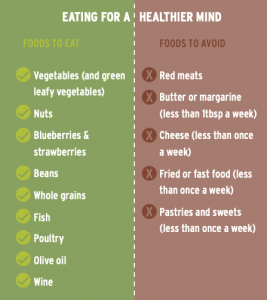Have an apple a day; eat your vegetables; cut out the junk food – these well-established nutritional tips from your parents have stood the test of time and peer review. However, as it turns out, it seems that what we should and should not eat may be less restrictive than we once thought, particularly when it comes to brain health. For instance, while you may never have been told to drink wine to ward off dementia, research from Loyola University Chicago’s Stritch School of Medicine has suggested that moderate social drinking significantly reduces the risk of dementia and cognitive impairment.
The research team’s findings, published in the 2011 issue of Neuropsychiatric Disease and Treatment, indicate that moderate drinkers (defined as a maximum of one drink a day for women and one to two for men) were 23% less likely to develop Alzheimer’s disease or exhibit signs of serious memory problems than non-drinkers. Both light and moderate drinking provided a similar benefit, but heavy drinking was associated with significantly higher cognitive risk for dementia and cognitive impairment (and is, of course, also associated with a host of other health issues).**
A more recent study, published in Neurology in February 2015, focused on the potential benefits of resveratrol – a compound found in some red wines, dark chocolate, and raspberries. The study suggests that resveratrol, taken in highly concentrated doses, could stabilize levels of a biomarker that declines in individuals with Alzheimer’s, thereby slowing the progression of the disease. During the clinical trial, half of the participants consumed a pure synthetic form of resveratrol while the other half received a placebo. The highest dose tested was one gram twice daily – the equivalent to the resveratrol contained in approximately 1,000 bottles of red wine! Since drinking alcoholic beverages is best in moderation, it may be difficult to get a sufficient dose of resveratrol from wine consumption alone.
A recent study published in the 2016 issue of Journals of Gerontology suggests that drinking three cups of coffee a day reduces the risk of Alzheimer’s in older women. The study involved nearly 6,500 women aged 65 and over who drank caffeinated beverages daily. Those who drank  at least two to three cups of coffee (more than 261 milligrams of caffeine per day) showed a lower risk of developing dementia or cognitive impairment ten years later than those who consumed less coffee.
at least two to three cups of coffee (more than 261 milligrams of caffeine per day) showed a lower risk of developing dementia or cognitive impairment ten years later than those who consumed less coffee.
It also turns out that a diet of foods rich in extra virgin olive oil, together with plenty of fruits and vegetables and a little red wine, seems to lower the risk of developing Alzheimer’s and other forms of dementia. While Alzheimer’s affects approximately 30 million people worldwide, the prevalence of the disease is lower in Mediterranean countries. Scientists previously attributed this to the high concentration of healthful monounsaturated fats in olive oil — consumed in large quantities in the Mediterranean diet. However, more recent research has suggested that the actual protective agent may be a substance called oleocanthal, which has effects that protect nerve cells from the kind of damage that occurs in Alzheimer’s.
To find out why, researchers from the University of Louisiana at Monroe’s College of Pharmacy sought evidence on whether oleocanthal helps decrease the accumulation of beta-amyloid (Aß) in the brain – the toxic protein that builds up in the brains of individuals with Alzheimer’s. Their study, which appeared in the 2013 issue of ACS Chemical Neuroscience, found that oleocanthal appears to help speed up the removal of beta-amyloid from the brains of laboratory mice. While further studies in humans are necessary to confirm this effect, the good thing about extra virgin olive oil is that it is both safe and easy to incorporate into our everyday diets.
Two years ago, a research team at Rush University in Chicago led by Dr. Martha Clare Morris, a nutritional epidemiologist at Rush, developed the MIND diet – a hybrid of the Mediterranean and DASH (Dietary Approaches to Stop Hypertension) diets. Dr. Morris and her colleagues believe that…
THE MIND DIET OFFERS THE BEST-KNOWN DEFENCE AGAINST BRAIN DEGENERATION.
In two observational studies, the MIND diet was impressively effective. In those participants who adhered to the diet rigorously, the risk of developing Alzheimer’s was lowered by as much as 53%, while those who followed the diet moderately saw their risk reduced by approximately 35%. The MIND diet is also easier to follow than the Mediterranean diet, which requires you to consume copious amounts of fish, as well as three to four servings of both fruits and vegetables daily.
“Alzheimer’s is a disease of aging,” says Dr. Morris, “and it’s not declining because our population is getting older. It’s a very costly disease and it’s a very devastating disease. Right now there are no treatments and there are no cures so it’s a very important public health problem.”
“Though we know that there is a strong link between what a person eats and health, dietary intervention trials to examine whether a change in diet will help prevent Alzheimer’s disease and other dementias have been largely neglected,” Dr. Morris notes.
 In an effort to better understand the relationship between nutrition and brain health, Dr. Morris and her team began conducting a randomized trial in February 2017 to examine why the MIND diet is so successful. Over the course of five years, the researchers will study 600 individuals aged 65 years and over who are overweight and have less-than-ideal diets — factors that make them vulnerable to developing Alzheimer’s disease.
In an effort to better understand the relationship between nutrition and brain health, Dr. Morris and her team began conducting a randomized trial in February 2017 to examine why the MIND diet is so successful. Over the course of five years, the researchers will study 600 individuals aged 65 years and over who are overweight and have less-than-ideal diets — factors that make them vulnerable to developing Alzheimer’s disease.
“The results of this study should help us to improve brain health by developing new dietary guidelines for clinical use and for public health education,” Dr. Morris says.
“IT’S UNFORTUNATE THAT THE FIELD OF NEUROLOGY HAS BEEN VERY STUBBORN TO BELIEVE THAT DIET COULD HAVE SOMETHING TO DO WITH NEURODEGENERATIVE DISEASES.”
Dr. Morris further notes that to date, there has not been a study “that has targeted people who have marginal levels of a nutrient and then supplemented them to see if it had a positive benefit on their cognition. Hopefully this trial will have a positive finding and then it should be even better.”
Dr. Morris’s work exemplifies another age-old pearl of health wisdom — an ounce of prevention is worth a pound of cure. “There’s been a 99.6% failure rate for drug trials for treatment of Alzheimer’s Disease,” says Dr. Morris. “That is not the case at all for the prevention trials. They have actually been very successful, in particular for cognitive activity and physical activity and their ability to slow cognitive decline.”
SNAPSHOT OF COMMON NUTRIENT GUIDELINES
- 1x Glass of wine per day*
- 1x Salad & one other vegetable a day
- 2x Poultry at least twice a week
- 3x Servings of whole grains a day
- 2x Berries at least twice a week
- 1x Serving of nuts a day
- Beans every other day
- 1x Fish at least once a week
SIGNS TO WATCH FOR
A sign that an aging family member may require more support could be a fridge full of uneaten food. While it  is normal for us to eat less as we get older, aging bodies still have important nutritional needs — especially when it comes to the mind.
is normal for us to eat less as we get older, aging bodies still have important nutritional needs — especially when it comes to the mind.
According to a 2012 report by the Dietitians of Canada entitled “The Role of Nutrition in Mental Health Promotion and Prevention,” because neurocognitive disorders tend to occur more frequently in older adults, it is believed that the link between nutrition and brain health may be related to consuming less food just when better nutrition is needed.
Numerous studies have shown that older adults have higher rates of nutritional deficiencies than younger age groups, particularly in the B-vitamins and Vitamin E. Vitamin B12, for example, affects neurocognitive develop- ment so deficiencies in this vitamin could lead to cognitive decline. Vitamin E may reduce brain amyloid beta peptide accumulation, which is known to be relevant in Alzheimer’s disease.
“Cognitive decline may be accelerated if nutritional defi- ciencies are not addressed,” the report indicates.
Read the original article in Vol. 4, Page 53 of Mind Over Matter magazine
** In January 2023, The Canadian Centre on Substance Use and Addiction issued Canada’s Guidance on Alcohol and Health, updating its 2011 Low Risk Drinking Guidelines. The new guidance states that no amount of alcohol is safe. It presents a continuum of risk and indicates that the risk of alcohol-related consequences begins to increase when consuming more than two standard drinks per week, which is considered low risk. Moderate risk is considered to be three to six standard drinks per week, where the risk of developing several cancers increases, while seven or more standard drinks — considered increasingly high risk — raises the risk of heart disease and stroke. – Dalhousie University




